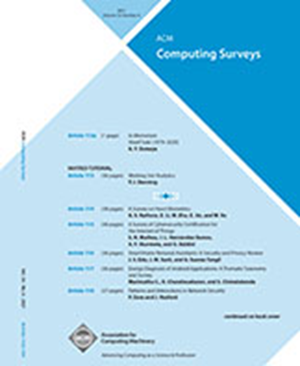Visual Question Answering: A Survey of Methods, Datasets, Evaluation, and Challenges
IF 23.8
1区 计算机科学
Q1 COMPUTER SCIENCE, THEORY & METHODS
引用次数: 0
Abstract
Visual question answering (VQA) is a dynamic field of research that aims to generate textual answers from given visual and question information. It is a multimodal field that has garnered significant interest from the computer vision and natural language processing communities. Furthermore, recent advances in these fields have yielded numerous achievements in VQA research. In VQA research, achieving balanced learning that avoids bias towards either visual or question information is crucial. The primary challenge in VQA lies in eliminating noise, while utilizing valuable and accurate information from different modalities. Various research methodologies have been developed to address these issues. In this study, we classify these research methods into three categories: Joint Embedding, Attention Mechanism, and Model-agnostic methods. We analyze the advantages, disadvantages, and limitations of each approach. In addition, we trace the evolution of datasets in VQA research, categorizing them into three types: Real Image, Synthetic Image, and Unbiased datasets. This study also provides an overview of evaluation metrics based on future research directions. Finally, we discuss future research and application directions for VQA research. We anticipate that this survey will offer useful perspectives and essential information to researchers and practitioners seeking to address visual questions effectively.视觉问题解答(VQA)是一个充满活力的研究领域,旨在根据给定的视觉和问题信息生成文本答案。它是一个多模态领域,已引起计算机视觉和自然语言处理界的极大兴趣。此外,这些领域的最新进展也为 VQA 研究带来了众多成果。在 VQA 研究中,实现平衡学习以避免偏向视觉信息或问题信息至关重要。VQA 的主要挑战在于消除噪音,同时利用来自不同模态的有价值的准确信息。为了解决这些问题,人们开发了各种研究方法。在本研究中,我们将这些研究方法分为三类:联合嵌入法、注意机制法和模式识别法。我们分析了每种方法的优缺点和局限性。此外,我们追溯了 VQA 研究中数据集的演变,将其分为三类:真实图像、合成图像和无偏数据集。本研究还概述了基于未来研究方向的评估指标。最后,我们讨论了 VQA 研究的未来研究和应用方向。我们预计,本调查将为寻求有效解决视觉问题的研究人员和从业人员提供有用的观点和基本信息。
本文章由计算机程序翻译,如有差异,请以英文原文为准。
求助全文
约1分钟内获得全文
求助全文
来源期刊

ACM Computing Surveys
工程技术-计算机:理论方法
CiteScore
33.20
自引率
0.60%
发文量
372
审稿时长
12 months
期刊介绍:
ACM Computing Surveys is an academic journal that focuses on publishing surveys and tutorials on various areas of computing research and practice. The journal aims to provide comprehensive and easily understandable articles that guide readers through the literature and help them understand topics outside their specialties. In terms of impact, CSUR has a high reputation with a 2022 Impact Factor of 16.6. It is ranked 3rd out of 111 journals in the field of Computer Science Theory & Methods.
ACM Computing Surveys is indexed and abstracted in various services, including AI2 Semantic Scholar, Baidu, Clarivate/ISI: JCR, CNKI, DeepDyve, DTU, EBSCO: EDS/HOST, and IET Inspec, among others.
 求助内容:
求助内容: 应助结果提醒方式:
应助结果提醒方式:


